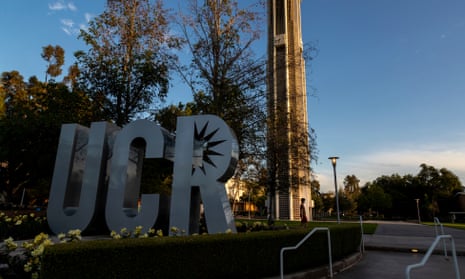An ethnic studies professor at the University of California, Riverside, will resign next year following more than a decade of outrage over accusations that she falsely claimed Indigenous American heritage.
Andrea Smith, once a heralded scholar of Native American studies, faced criticism since at least 2008 for claiming she was Cherokee but had remained employed at the southern California university. Last year, 13 of her colleagues at UC Riverside alleged that she made fraudulent claims to Indigenous American identity and violated academic integrity.
Months later, Smith reached a deal with the university and agreed to resign in August 2024. Under the terms of the agreement, Smith will not be subjected to investigation and will continue teaching classes until her retirement. She will keep her retirement benefits and her honorary emeritus title. UC Riverside will also cover up to $5,000 of her legal expenses related to the complaint. The agreement could help the university avoid more costly litigation.
The settlement agreement, made public earlier this month, will bring a “timely conclusion” to Smith’s employment, John D Warren, a university spokesperson, told the New York Times.
“Investigations of a tenured faculty member for alleged misconduct have potential for litigation and appeals, and can unfold over the course of years.”
The agreement seems to bring to a close a years-long controversy over Smith allegedly misrepresenting her identity. Prominent Indigenous American scholars repeatedly questioned and publicized their concerns about Smith falsely claiming she had Cherokee heritage, despite not being an enrolled tribal member nor having any documented ties.
Smith reportedly knew she had no Indigenous American heritage since the 1990s when she hired Cherokee genealogical researcher David Cornsilk to look into her maternal ancestry and, years later, to investigate her paternal lineage, according to a 2021 New York Times report.
In response to criticism over her claims to Cherokee heritage, Smith wrote in 2015: “I have always been, and will always be Cherokee.”
Smith’s is one of several high-profile cases of academics allegedly falsely claiming Indigenous heritage, what some call “pretendians”. Earlier this year, a white anthropologist at UC Berkeley known for her work on food justice in Indigenous American communities apologized for wrongly claiming to be Indigenous American. Elizabeth Hoover said she had incorrectly identified as Indigenous her entire life due to incomplete information.
after newsletter promotion
Senator Elizabeth Warren apologized to the Cherokee Nation after backlash over her claims of Indigenous American ancestry.
Jacqueline Keeler, a writer who investigates people who falsely claim Indigenous ancestry for personal gain, and who posted the details of Smith’s agreement earlier this month, told Inside Higher Ed: “Academia is basically a pretendian factory.”
“It is the ultimate form of colonization, where they actually become us instead of actually listening to us,” she told the outlet.
